Music in Greek Mythology
Classical Antiquity
Public domain, via Wikimedia Commons
Ancient Greece was not a unified nation, but was divided into small city-states called poleis.
The most prominent polis was Athens. Since it was ruled by an assembly of all the free male citizens, it is considered the birthplace of democracy. Some of its famous citizens included the philosophers Socrates, Plato, and Aristotle; historians Herodotus, Thucydides, and Xenophon; playwrights Aeschylus, Sophocles, Euripides, and Aristophanes; the physician Hippocrates; the mathematicians Democritus and Euclid; and generals such as Pericles and Themistocles. Athens was also the richest of the Greek city-states and had the most powerful navy.
Other city-states achieved prominent roles in Greek history, including Sparta, famous for its nearly undefeatable military; Delos, home to the Athenian treasury; Delphi the home of Pythia, the Oracle of Apollo; Ithaca and Argos, the homes of legendary heroes Odysseus and Jason; and Olympus, believed to be the home of the gods and the site of the quadrennial Olympic Games.

Edward Sheffield Bartholomew, CC0, via Wikimedia Commons
Although each polis had its own government and traditions, they were united by a common culture, including a shared language, religious practices, and literary traditions.
The oldest and most fundamental work of Greek literature is Homer's Iliad, which tells the story of the Trojan War, and its continuation Odyssey, which describes the homeward journey of the hero Odysseus. These works are beautiful texts which contain masterful insights into human nature, with all its pride, greed, heroism, and honor. Homer's stories are referenced in hundreds of other works of literature.
Homer also references the Greek pantheon ("all the gods"), including many figures reverenced throughout Greece, though each city had its local favorites.
- Zeus, god of the sky and king of the gods
- Poseidon, god of the sea
- Hades, god of the underworld
- Hera, goddess of marriage and mothers
- Ares, the god of war
- Athena, goddess of war and wisdom
- Apollo, god of the sun
- Artemis, goddess of hunting
- Dionysius, god of wine
- Aphrodite, goddess of love
- Hephaestus, god of fire
- Hermes, the gods' messenger
- Nike, the goddess of victory
- Nemesis, the goddess of revenge
The very word music comes from the nine Muses (Μοῦσαι), daughters of Apollo who inspired artists. The Greek language is inflected with musical qualities like pitch and duration, and so “music” covered a broad range of disciplines. Calliope, Erato, and Polyhymnia inspired different types of poetry; Thalia and Melpomene inspired comedy and tragedy; Clio inspired history, and Terpsichore dance. Only one of the Muses, Euterpe, inspired what we today limit the word “music” to.
The most famous musician in the Greek legendarium is Orpheus, the son of King Oeagrus of Thrace and the Muse Calliope. He was taught to play the lyre by Apollo and figures in many important myths. In one story, Orpheus saved the Argonauts from the Sirens by performing a song more alluring than theirs. In another, Orpheus (nearly) rescued his dead wife Eurydice from the Underworld by so charming the god Hades with his music that he agreed to let her go. The lyre of Orpheus became the symbol for music in Western culture and his myths have been the subject of many compositions.

Musicologists actually have a decent idea of what ancient Greek music sounded like. The Greeks wrote extensively about music, and a few segments of their ancient letter-based notation system have been preserved, most notably the Epitaph of Seikilos, discovered in Smyrna in 1883, and the Delphic Hymns, discovered in Delphi ten years later.
The text of the Epitaph is a short poem in Greek which reads, "While you live, shine | have no grief at all | life is only for a short time | and time demands his due.” Above each word of the text is a Greek letter indicating a scale degree on which the words would have been sung. The scale is usually interpreted to be a Mixolydian diatonic scale, which will be discussed in the lesson on modes. The Delphic Hymns are songs written in honor of Apollo.
